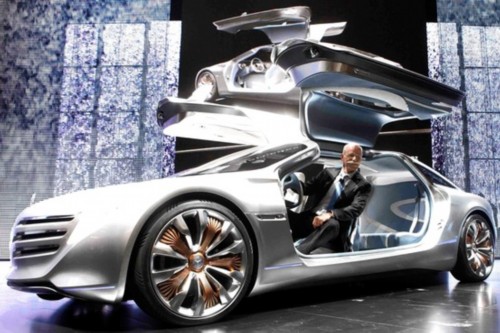Aluminium Heatsink Profile,Aluminium Heatsink Profile Frame,Heatsink Profile Frame,Heatsink Profile Aluminium Frame FOSHAN WINKAI ALUMINIUM CO.,LTD , https://www.winkaialu.com The profits of German luxury car manufacturers have surpassed their competitors. The picture shows Daimler CEO Dieter Zetsche demonstrating the Mercedes-Benz F125 concept car.
The profits of German luxury car manufacturers have surpassed their competitors. The picture shows Daimler CEO Dieter Zetsche demonstrating the Mercedes-Benz F125 concept car.
With the Frankfurt Auto Biennale kicking off on Tuesday, the focus will be on the strong profitability of the German automotive industry and the launch of dozens of new cars.
Between flashy product launches and roaring engines in the test lane, executives of car manufacturers will exchange their expectations for sales and work hard to assess whether there will be another downturn in sales.
At the 2009 Frankfurt Motor Show, almost no one expected the auto industry to rebound sharply from the global recession that year. The rapid growth of emerging market demand (especially China's demand) and the revival of the United States and Europe, these have caused many global auto manufacturers to restore strong profits.
The most profitable companies include: BMW AG, Daimler AG's Mercedes, Volkswagen AG's Audi, and Porsche AG. In the past year, especially with the strong demand from Chinese buyers, the revenue and profitability of these brands have reached record highs.
However, signs of sluggish economic growth and high levels of public debt have raised concerns that car sales in Europe and the United States may slow. There are signs that, given that emerging market governments are trying to control overheating economic growth, emerging markets will not be able to continue to make up the gap as profit engines.
Although automakers such as Volkswagen and BMW have already warned that hot global car sales may slow down in the second half of the year, industry observers are concerned that sales slowdown may be sluggish.
Tim Urquhart, an analyst at research firm IHS Automotive in London, said there are many potential sources of instability. China needs only a macroeconomic shock and the entire situation may collapse.
The brewing of global economic challenges has begun to affect some mass-market automakers. Such producers have weak pricing power and the profits of the smaller cars produced are even more subdued, making it difficult to digest any impact on sales. In Brazil, companies such as Volkswagen have recently reduced their frequency in order to adapt to the government’s tightening credit initiatives. PSA Peugeot Citroen warned that there may be losses in the second half of the year. The company’s sales largely depend on Europe’s declining market. Overall, many European mass-market automakers have made little or no profit from their European operations.
For many investors, the biggest question is whether luxury cars can continue to grow with stable profits and not be affected by increasingly weak economies. Sales of luxury cars currently do not appear to have slipped.
This depends to a large extent on whether China’s fast-growing wealthy groups will continue to pursue full-scale deployment of large luxury cars, despite the overall slowdown in the Chinese auto market. The August sales report released by sports car manufacturer Porsche on Monday seems to confirm China’s good appetite for luxury cars: So far this year, Porsche’s sales in China and in the world have climbed 84% and 30% respectively. Even in depressed Europe, sales rose by 8%.
Bernhard Maier, Porsche sales director, declared that our sales in all regions are increasing.
German luxury car makers stated that they have other reasons for their favorable position in the depressive situation. These manufacturers have more cash reserves than before the global economic crisis of 2008 and 2009. BMW and Daimler, in particular, both survived the last recession by cutting costs and streamlining savings. They also reduced their dependence on rental car sales a few years ago, especially in the United States.
BMW Chief Financial Officer Friedrich Eichiner said that if BMW is facing the same degree of recession as at the end of 2008, we will undoubtedly make a profit. BMW suffered a significant loss in 2008.
At the same time, he said, as for all the discussions on the recession or the second recession, there are currently no signs of seeing in our market data; in China, we have no problem and supply still falls short of demand. He mentioned that the best-selling BMW 5 Series takes about two months of waiting time in China.
Despite this, analysts cautioned that the weak economy is not necessarily the first to be reflected in car demand, and that luxury car sales usually take longer to feel the impact.
China, Brazil and India are big factors. All three governments have raised interest rates to curb inflation. In China, the government has adopted measures to restrict the registration of new cars in certain large cities and to cancel some of the tax incentives for auto purchases. Chinese auto industry officials said on Friday that it is currently expected that the number of commercial vehicles and passenger cars will only grow by 5% in 2011, an increase of 32% last year, and total sales of 18 million.
Although Germany is still one of the few hot spots in Europe where several new cars are sold, in most other European markets, such as Spain, Italy and the United Kingdom, sales of new cars have fallen due to austerity measures taken by the government to reduce high public debt.
In the United States, car sales still performed well, but weakened consumer confidence and high unemployment rate prompted some analysts to lower their expectations for 2011. Moody's Investors Service said last week that it now expects US car sales to grow by 8% to 12.5 million units in 2011, compared to the previous forecast of 13.5 million vehicles.